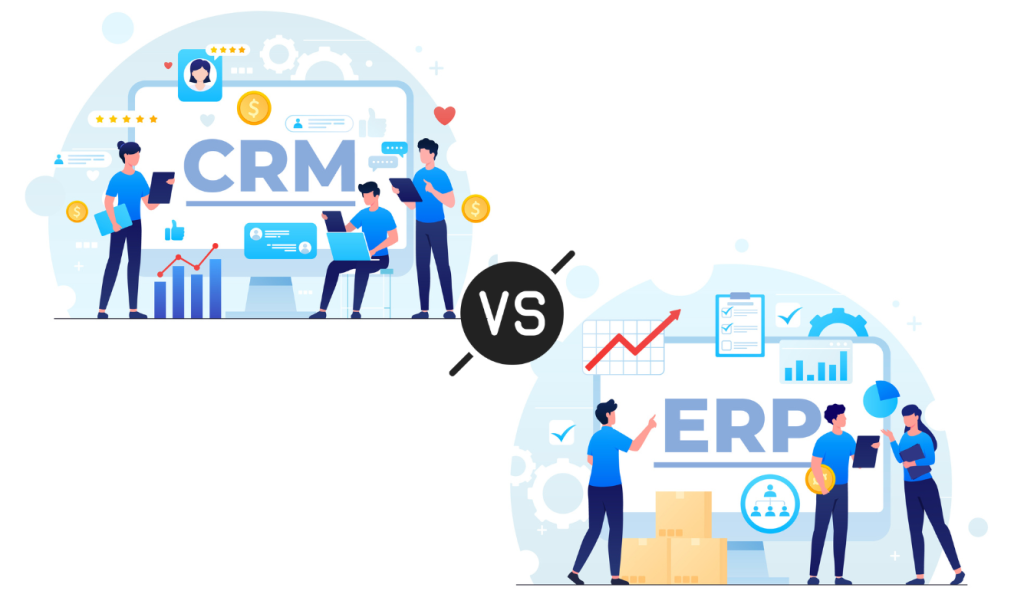Customer Relationship Management (CRM) and Enterprise Resource Planning (ERP) are two critical software systems that help businesses streamline their operations and boost efficiency. Though they share some similarities—such as improving business processes—they serve different purposes. Understanding the difference between CRM and ERP software is essential for selecting the right solution for your business needs.
This blog post by Creative Networks explore what CRM and ERP software are, their core differences, and how they can work together to enhance overall business performance.

What is CRM Software?
Customer Relationship Management (CRM) software is designed to help businesses manage interactions with current and potential customers. It focuses on improving sales, marketing, and customer service efforts by organising customer data, automating repetitive tasks, and tracking engagement with clients.
Key Features of CRM Software:
- Contact Management: CRM stores detailed customer information, including contact details, communication history, purchase history, and customer preferences in a centralised location.
- Sales Automation: CRM platforms streamline sales processes, track leads, automate follow-ups, and manage the sales pipeline to improve sales efficiency.
- Marketing Automation: CRM systems offer tools to manage marketing campaigns, automate email marketing, and track campaign performance.
- Customer Service Management: CRM platforms help support teams handle inquiries, complaints, and service requests, ensuring timely responses and improved customer satisfaction.
- Reporting & Analytics: CRM systems provide analytics and reports on customer behavior, sales performance, and campaign effectiveness, helping businesses make data-driven decisions.
Common CRM Systems:
- Salesforce: One of the most popular CRM platforms, Salesforce offers robust tools for sales, marketing, and customer service, making it a go-to solution for businesses of all sizes.
- Microsoft Dynamics 365: Known for its flexibility, Dynamics 365 integrates CRM with ERP functionalities, providing a powerful tool for managing sales, customer service, and business operations.
- HubSpot: A user-friendly CRM platform, particularly for small businesses, HubSpot offers a suite of free tools for sales, marketing, and customer support.
- Zoho CRM: A cost-effective solution that provides a wide range of CRM features, including sales automation, marketing campaigns, and customer service management.
Core Purpose of CRM:
The main goal of CRM software is to enhance customer relationships, increase sales, and improve customer retention. CRM systems are customer-centric, helping businesses maximize their engagement with clients by improving customer satisfaction and driving sales growth.
What is ERP Software?
Enterprise Resource Planning (ERP) software is designed to manage various internal business processes by integrating different departments, such as finance, supply chain, human resources, and manufacturing, into one system. ERP provides a unified view of an organisation’s operations, improving efficiency and enabling better decision-making.
Key Features of ERP Software:
- Financial Management: ERP systems offer tools for managing financial transactions, accounting, payroll, budgeting, and financial reporting.
- Supply Chain Management: ERP software helps businesses manage inventory, procurement, and logistics, optimising supply chain operations.
- Human Resources (HR) Management: ERP platforms handle employee records, payroll, recruitment, and performance management.
- Manufacturing & Production Management: ERP systems provide tools for managing production schedules, tracking materials, and ensuring product quality in manufacturing environments.
- Reporting & Analytics: ERP solutions offer detailed reports and analytics across all departments, from financial performance to operational efficiency, giving businesses a holistic view of their operations.
Common ERP Systems:
- SAP ERP: A comprehensive solution used by large enterprises to manage complex business processes across various departments, including finance, HR, and supply chain.
- Oracle ERP: Known for its integrated solutions, Oracle ERP offers tools for managing finance, HR, procurement, and operations.
- Microsoft Dynamics 365: Dynamics 365 serves as both a CRM and ERP system, allowing businesses to manage customer relationships and internal operations in a single platform.
Core Purpose of ERP:
The primary focus of ERP software is on improving operational efficiency by integrating and automating business processes. ERP systems are designed to streamline back-office operations such as finance, HR, and supply chain management, reducing costs and optimizing resource usage.
Key Differences Between CRM and ERP Software
Although CRM and ERP systems both aim to improve business processes, they serve different functions and focus on different aspects of an organisation.
Below are the key differences between CRM and ERP:
1. Focus and Functionality
- CRM: CRM software is focused on managing customer relationships. It helps businesses track customer interactions, manage sales leads, and improve customer satisfaction by enhancing sales, marketing, and customer support functions.
- ERP: ERP software is focused on managing internal business processes. It integrates various departments like finance, HR, supply chain, and manufacturing to streamline operations and improve efficiency.
2. Target Users
- CRM: CRM systems are primarily used by customer-facing teams, such as sales, marketing, and customer service, to manage interactions with customers and improve client relationships.
- ERP: ERP systems are used across all departments, including finance, HR, operations, procurement, and manufacturing, to manage resources, track inventory, and handle business processes.
3. Data Management
- CRM: CRM platforms store customer data, such as contact details, communication history, and sales records, helping businesses better understand and engage with their clients.
- ERP: ERP platforms store operational data, such as financial transactions, inventory levels, employee information, and production schedules, helping businesses manage their internal operations.
4. Revenue Generation vs. Cost Efficiency
- CRM: CRM systems focus on generating revenue by improving customer relationships, driving sales growth, and retaining customers.
- ERP: ERP systems focus on cost efficiency by optimising internal processes, reducing operational inefficiencies, and streamlining resource management.
5. Implementation Complexity
- CRM: CRM systems are generally easier to implement because they are primarily focused on sales and customer data. Many CRM platforms offer cloud-based solutions, making them simpler to deploy and scale.
- ERP: ERP systems are more complex and require careful planning and integration across multiple departments, such as finance, HR, and supply chain. ERP implementations often involve significant customisation to meet the needs of different business areas.
6. Integration Needs
- CRM: CRM platforms often need to integrate with other tools like email marketing platforms, e-commerce systems, and social media. These integrations are typically less complex than ERP integrations.
- ERP: ERP software must integrate with various internal systems, including finance, HR, and supply chain, requiring extensive coordination between departments and systems.

How CRM and ERP Work Together
While CRM and ERP serve different purposes, they can complement each other when integrated. Many businesses benefit from using both systems to create a unified approach to managing customer interactions and internal operations.
Example of CRM and ERP Integration:
- A sales team using CRM can access customer purchase history stored in the ERP system to tailor their sales strategy and offer personalised service.
- An ERP system can notify the CRM system when inventory levels are low, ensuring that sales teams have accurate information when discussing delivery timelines with customers.
Integrating CRM and ERP helps businesses improve both customer-facing operations and internal processes, providing a complete view of business performance.
CRM vs. ERP – Which One Does Your Business Need?
Understanding the difference between CRM and ERP software is crucial for selecting the right solution for your business. If your focus is on improving customer relationships, increasing sales, and managing marketing efforts, a CRM system is the best fit. On the other hand, if your goal is to streamline internal operations, optimise resources, and manage departments like finance and HR, an ERP system will better serve your needs.
Many businesses find that using both CRM and ERP systems allows them to cover all aspects of their operations. Whether your business needs one or both systems, integrating them can create a more efficient, data-driven organisation.
Looking for the Right CRM or ERP Solution?
At Creative Networks, we help businesses select and integrate the right CRM and ERP software to optimize processes and boost efficiency. Whether you’re focused on improving customer engagement or streamlining internal operations, we have the expertise to guide you.
Contact us today to find the perfect solution for your business needs.




